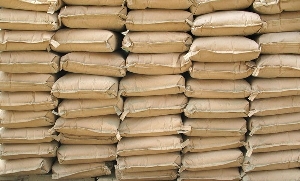- Home - News
- TWI News | TV
- Polls
- Year In Review
- News Archive
- Crime & Punishment
- Politics
- Regional
- Editorial
- Health
- Ghanaians Abroad
- Tabloid
- Africa
- Religion
- Election 2020
- Coronavirus
- News Videos | TV
- Photo Archives
- News Headlines
- Press Release
General News of Wednesday, 11 April 2007
Source: GNA
Increase spending on mining communities
Accra, April 11, GNA - The Ghana Chamber of Mines has charged government to increase its spending on mining communities, considering the improved balance of payment situation.
Briefing journalists in Accra on Tuesday at a send-off for Mr Bill Zisch, Vice President, Newmont Africa and Asia, Ms Joyce Aryee, Chief Executive of Ghana Chamber of Mines, said there was need with the current improved situation to go beyond just sending money to the mining communities.
Ms Aryee said: 93Government should work towards building capacity and helping people in mining communities to actually create wealth for themselves," she said.
"We believe that now that we have a better balance of payment credit situation, it is better to send a little more money that would improve the infrastructure in the communities so that other companies would be attracted into investing in the mining communities," Ms Aryee added.
Government currently gives 10 per cent of royalties paid by mining companies to the Stool Lands Commission for development. Ms Aryee noted that the Chamber and the industry want to see a policy that made mining an integral part of the development agenda. "Right now it provides a lot of revenue. It should go beyond providing revenue. It should help people take control of themselves and spread development so that we can really move the nation ahead."
It should help people to create wealth for themselves in the communities, Ms Aryee added.
She asked the media to buy into the idea of being advocates for change in the mining industry that would ensure that living standards were improved consistently.
Ms Aryee commended Mr Zisch, who is to be replaced by Mr Gordon Nixon, for raising the standards in the industry, saying he had been extremely proactive in the industry and the Chamber, bringing his experience from places such as the US, Asia and South America, which share similar environmental and social challenges as Ghana. Ms Aryee explained that even though Newmont is big and so people get at them, 93I can say that Bill had done a lot with pioneering the presence of Newmont in the country".
She singled out Mr Zisch for getting actively involved in the activities of the Chamber, something which worked in helping change some things in the industry and urged Mr Nixon to do the same. Mr Zisch said the industry had made some progress but there was still more to be done to transform the industry and boost development. He noted that Newmont came to Ghana in 2003 and had since made it a point to get the Ahafo project off the ground.
He said it had been quite an accomplishment for Newmont to pour its first gold in July 2006 spending over 450 million dollars. "We are very pleased to be part of such a project and have met the commitment of providing over 4,000 jobs, some of which are persons who were trained and could get jobs elsewhere."
The company currently employs over 2,000 people at its Ahafo project with 95 per cent being Ghanaians and 40 per cent coming from the community.
Mr Zisch said Newmont had increased its reserves from three million ounces to 12 million ounces, saying the company had a long period to be in Ghana and that means more jobs and more royalties. Mr W.J. Paku, Deputy Chief Stool Lands Administrator, welcomed the call to give back more to the communities, saying chiefs were already demanding an increase.
He said at a recent forum, mining companies were asked to increase their contribution to six per cent.
Mr Paku explained that under the current status of distribution, mining companies pay three per cent of their profits to government 10 per cent of which goes to the Mineral Development Fund. Another 10 per cent goes to the Stool Lands Commission, which goes to the communities out of which another 10 goes into administrative cost and the remaining 90 per cent to the communities. Twenty-five per cent of the 90 per cent goes to the stool area, 20 per cent to the traditional council and 55 per cent is paid to the District assembly. 11 April 07










